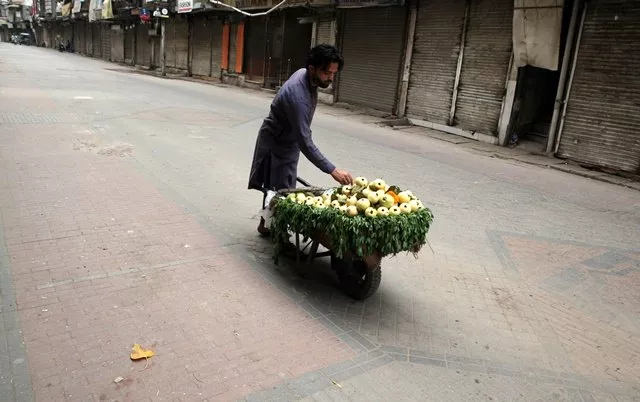Vulnerable workers to be hit badly by COVID-19
Wholesale, retail trade expected to lay off highest number of vulnerable employees
KARACHI: Coronavirus is expected to take a heavy toll on the workforce, part of which was already struggling to make ends meet prior to the spread of the pandemic, as the proportion of people living below the poverty line is projected to double.“Wholesale and retail trade is expected to witness the highest layoffs of 4.55 million people, thus, the poverty rate in Pakistan can increase from 23.4% to 44.2%,” stated a report of Dun & Bradstreet Pakistan.
According to the report, approximately 12.3 million people are likely to experience unemployment under moderate restrictions by the government, similar to those implemented currently to combat the Covid-19 pandemic. “This is approximately 46.3% of the total vulnerable workforce and 19.4% of the total employed workforce in Pakistan,” it said.
Total labour force of Pakistan consists of 63.4 million people, out of which vulnerable employees amount to 26.41 million or 41.6%.
The report defined vulnerable employment as the proportion of own-account workers and contributing family workers in the total employment. Poor workers generally depend on daily wages and such workers are likely to be the most vulnerable individuals who could lose their jobs due to the Covid-19 pandemic.
Owing to a slowdown in economic activity and high proportion of vulnerable employment in the country, Pakistan could see a significant increase in poverty and unemployment in coming months, warned the report.
It underlined that wholesale and retail trade was the second largest segment having vulnerable employment (of 6.49 million people) but still it was expected to lose the highest number of workers.
The report put the number at 4.55 million in the wholesale and retail segment, which translated into 70.11% of the total vulnerable workforce employed in it.
The report pointed out that the agriculture sector had the highest number of vulnerable employees amongst all categories, at around 12.82 million. However, the coronavirus threatened the employment of only 2.56 million or 20% of the vulnerable workforce in the segment.
“Transport and communication sector has 1.95 million vulnerable jobs where 1.76 million (almost 90%) jobs can be lost,” it said. “Similarly, manufacturing sector has 2.16 million vulnerable jobs, out of which 1.51 million or 70% can be laid off.”
Hotels and restaurants, which employ 600,000 vulnerable workforce, are projected to lay off 540,000 or 90% of it. Vendors provide jobs to 790,000 vulnerable workers and they may sack 470,000 or 60% of the workers.
Other community or social segments are expected to lose 380,000 workers, construction may lose 220,000 and public administration sections may lose 130,000 vulnerable people, according to the report of Dun & Bradstreet Pakistan, which provides data and insights for businesses. Real estate and similar businesses are expected to lay off 100,000 workers in the vulnerable segment.
The education sector might lay off 60,000 or 66.67% of vulnerable workers while the fishing sector is on the brink of losing 30,000 such workers. On the other hand, the health and social work segment, having 190,000 vulnerable jobs, is not projected to lay off a single worker, according to the report.
“Companies in the IT sector highlight that their operations will be severely impacted during and post-lockdown as the corporate sector may freeze or reduce its IT spending,” it said. Owing to the suspension of flights, aviation, travel and tourism businesses echoed negative sentiment regarding their sales over the next quarter.
Manufacturing companies highlighted that their businesses had already been severely affected due to the closure of factories, said the report. A few manufacturers also highlighted that contracts already awarded were being cancelled or postponed. “While the current sentiment is pessimistic, the future outlook is uncertain and there is fear of it deteriorating further,” it added.
Companies in the fast moving consumer goods (FMCG) and retail sectors were somewhat positive as their sales increased significantly in March due to panic buying and hoarding by individuals, retailers and wholesalers, buying for donations and ration distribution.
Trading companies expect business operations to be impacted due to restrictions on trade and transportation imposed on account of the lockdown.
“It is important to ensure that all the relief packages announced by the government are implemented swiftly and reach the intended beneficiaries,” said Dun and Bradstreet Pakistan CEO Nauman Lakhani.
“Policymakers should continue to closely monitor the situation and remain on standby for further interventions.” He directed the businesses to continue to plan tactically for sustaining current business operations and seeing through the lockdown period. The government should also plan for return to normalcy and prepare revival plans for key sectors of the economy, the CEO added.
Published in The Express Tribune, April 8th, 2020.
Like Business on Facebook, follow @TribuneBiz on Twitter to stay informed and join in the conversation.


COMMENTS
Comments are moderated and generally will be posted if they are on-topic and not abusive.
For more information, please see our Comments FAQ